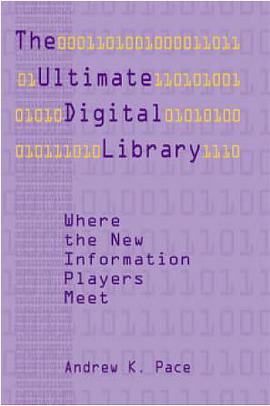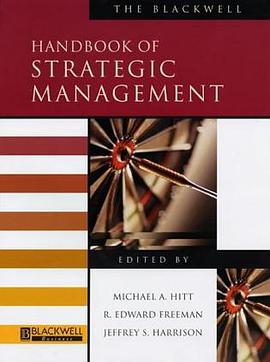

具体描述
Develop a Well-Measured Defense Against CybercriminalsWhen we speak of the hacker mind, then, we have come to mean the mind of a miscreant motivated by a broad range of ulterior purposes. We mean script kiddies who download scripts written by others and execute them with the click of a button, we mean vandals with limited impulse control, we mean thieves of data, and then we mean all the people who use that data for extortion, corporate or industrial espionage, state-level spy craft, identity theft, grand larceny, blackmail, vicious revenge, or terror. That's lots of kinds of minds, needing to be understood, needing to be profiled, needing to be penetrated, needing to be known inside and out.--from the preface by Richard Thieme.
Kevin Mitnick ExposedThe infamous hacker Kevin D. Mitnick allows himself and one of his more significant hacks to be weighed and measured.
Cyber Terrorist: Just a Media Buzzword?Learn how the second we become narrow-minded about the security of our organizations and the resolve of our cyber enemy is the second we become vulnerable to some of the worlds most dangerous minds.
Understand Adversary ModelsCan you answer the same questions your adversary will be asking, such as "If I were to attack this target, what effort will be made to identify me, if my attack is detected?"
Characterize Specific ThreatsIdentify where the real threats to your most critical assets lay and learn to answer the question of why you believe those threats are so real.
Manage the Insider ThreatSee how the key to early insider threat detection is in understanding how disgruntled employees move down the critical pathway towards an attack.
Characterize the Extremes-Terrorists and Nation StatesSee why the authors believe that the concept of cyber terrorism should be viewed as a very real and critical emerging threat.
Monitor a Cyber StalkerLearn how software concepts such as "WarmTouch" can help restore the psychological insights lost through traditional, technology driven insider detection techniques.
Case Studies Offer Insight and LessonsSee how characterization theory can be used to analyze some of histories more memorable incidents with 20/20 vision.
Your Solutions Membership Gives You Access to:
Comprehensive FAQ page that consolidates all of the key points of this book into an easy to search web page
"From the Author" Forum where the authors post timely
The complete code listings from the book
These downloadable e-booklets:WarDriving: Drive, Detect, Defend: Learning to WarDriveStealing the Network: How to Own a Continent: Product of Fate: The Evolution of a HackerIT Ethics Handbook: Right and Wrong for IT Professionals: Ethics for Programmers and AnalystsRichard Thieme's Islands in the Clickstream: Reflections on Life in a Virtual World
ABOUT THE AUTHORSTom Parker is a computer security analyst who, along side his work for some of the world's largest organizations, providing integral security services is widely known for his vulnerability research on a wide range of platforms and commercial products. His more recent work includes the development of an embedded operating system, media management system and cryptographic code for use on digital video band (DVB) routers, deployed on the networks of hundreds of large organizations around the globe. In 1999, he helped form Global InterSec LLC, playing a leading role in developing key relationships between GIS and the public and private sector security companies. Whilst continuing his vulnerability research, focusing on emerging technologies and new vulnerability exploitation techniques, Tom spends much of his time researching methodologies aimed at characterizing adversarial capabilities and motivations against live, mission critical assets, providing methodologies to aid in adversarial attribution in the unfortunate times when incidents do occur. Currently working as a security consultant for NetSEC, a provider of managed and professional security services; Tom continues his research into finding practical ways for large organizations, to manage the ever growing cost of security, through the identification where the real threats lay there by defining what really matters. Tom is a contributing author to "Stealing the Network: How to Own a Continent" by Syngress publishing (ISBN: 1-931836-05-1).
Matthew G. Devost is President and CEO of the Terrorism Research Center, Inc., overseeing all research, analysis and training programs. He has been researching the impact of information technology on national security since 1993. Matthew is certified in the National Security Agency's INFOSEC Assessment Methodology and is an instructor for the Threat, Exposure and Response Matrix (TERM) methodology. He is a member of the American Society for Industrial Security, the Information Systems Security Association, and the International Association for Counterterrorism & Security Professionals. He has appeared on CNN, MSNBC, FoxNews, NPR, CBS Radio, BBC television, NWCN, Australian television and over five dozen other domestic and international radio and television programs as an expert on terrorism and information warfare.
Marcus H. Sachs is the Director of the SANS Internet Storm Center and is a cyberspace security researcher, writer, and instructor for the SANS Institute. He previously served in the White House Office of Cyberspace Security and was a staff member of the President's Critical Infrastructure Protection Board. While a member of the White House staff, Marcus coordinated efforts to protect and secure the nation's telecommunication and Internet infrastructures, leveraging expertise from United States government agencies, the domestic private sector, and the international community. He also contributed to the National Strategy to Secure Cyberspace, upon his joining of the National Cyber Security Division of the US Department of Homeland Security.
Eric Shaw is a clinical psychologist who has spent the last 20 years specializing in the psychological profiling of political actors and forensic subjects. He has been a consultant supporting manager development and organizational change, a clinician aiding law enforcement and corporate security, an intelligence officer supporting national security interests and a legal consultant providing negotiation and litigation assistance. He has also provided cross-cultural profiling for the U.S. Government on the psychological state and political attitudes of figures such as Saddam Hussein, Iranian revolutionary leaders under Khomeini, senior Soviet military commanders, as well as Yugoslav, Laotian, Cuban and other military and political leaders.
Ed Stroz (CPA, CITP, CFE) is President of Stroz Friedberg, LLC, which he started in 2000 after a sixteen-year career as a Special Agent for the Federal Bureau of Investigation (FBI). Stroz Friedberg performs investigative, consulting, and forensic laboratory services for the most pre-eminent law firms in the country. In 1996, while still a Special Agent, he formed the FBI's Computer Crime Squad in New York City, where he supervised investigations involving computer intrusions, denial-of-service attacks, illegal Internet wiretapping, fraud, money laundering, and violations of intellectual property rights, including trade secrets. Among the more significant FBI investigations Ed handled were: Vladimir Levin's prosecution for hacking a US bank from Russia; the hack against the New York Times web site; the Internet dissemination by "Keystroke Snoopers," a hacking group responsible for a keystroke capture program embedded in a Trojan Horse; Breaking News Network's illegal interception of pager messages; the denial of service attack against a major business magazine; efforts to steal copyrighted content from the Bloomberg system; and the hack of a telecommunications switch.
TOCForeword by Jeff MossChapter 1: IntroductionChapter 2: Theoretical Characterization MetricsChapter 3: Disclosure and the Cyber Food ChainChapter 4: Rating the Attack: Post-Incident Characterization MetricsChapter 5: Asset Threat CharacterizationChapter 6: Bringing It All Together: Completing the Cyber Adversary ModelChapter 7: WarmTouch: Assessing the Insider Threat and Relationship ManagementChapter 8: Managing the Insider ThreatChapter 9: The Cyber Adversary in Groups: Targeting Nations' Critical InfrastructuresChapter 10: Characterizing the Extremes-Terrorists and Nation StatesChapter 11: ConclusionsChapter 12: Return on InvestmentGlossary
作者简介
目录信息
读后感
评分
评分
评分
评分
用户评价
阅读完后,我最大的感受是,这本书成功地构建了一个高度真实且复杂的多维度的网络对抗图景。它没有为了迎合大众而简化问题的复杂性,而是直面了现代网络犯罪和国家支持的威胁行为体所展现出的组织化、专业化和高度隐蔽性的现实。作者的写作风格带着一种冷静的、近乎临床的分析口吻,不带情绪,只关注事实和逻辑链条的构建。特别是在探讨对手如何利用供应链漏洞进行渗透时,那种层层深入、步步为营的逻辑推演,让人不寒而栗。它不是一本告诉你“如何做好防御”的书,而是一本告诉你“你的对手有多么高明,他们会如何针对你现有的弱点”的书。这种“反向工程式”的知识输出,极大地提升了阅读者的安全敏感度。我感觉自己好像是站在一个高空观察塔上,第一次清晰地看到了敌人的整个兵力部署和行动预案,而不是仅仅在地面上被动应对每一次突袭。这本书,绝对是安全领域从业者工具箱中不可或缺的一件精密仪器。
评分从结构上看,这本书的叙事节奏把握得相当老道,虽然主题严肃且技术性强,但它巧妙地通过一系列精心挑选的“侧面描绘”来构建完整的敌人画像。我特别喜欢它对“动机”的探讨部分,作者没有满足于传统的“金钱或政治”的简单标签,而是深入剖析了不同组织在内部驱动力、风险承受能力以及组织文化如何影响其网络行动选择的微妙差异。这使得整本书读起来不再是冰冷的二进制代码描述,而更像是一部关于网络时代权力博弈的社会学研究报告。例如,书中对某个国家支持的黑客组织在不同领导层更迭期间行为模式的微妙转变分析,就极其精妙地结合了国际关系学的理论。这提供了一个全新的维度,让我们不只是把攻击者看作是技术上的漏洞利用机器,而是拥有复杂社会属性的行为实体。这种跨学科的融合,极大地拓宽了安全研究的边界,让人在合上书本后,思考的维度都变得更加开阔和深远。
评分坦白说,这本书的阅读体验与其说是“阅读”,不如说是一场高强度的思维训练。它很少提供现成的、即插即用的解决方案,反而更像是在提供一个分析框架和一套严谨的推理工具箱。书中的案例剖析极为细致入微,每一个被拆解的攻击链条都显示出作者在网络空间渗透测试和逆向工程方面深厚的功底。我印象最深的是关于“零日漏洞利用链的生命周期管理”那几章,作者对于攻击者如何在发现、武器化、分发和回收利用漏洞这一整个生态系统中的决策点进行了近乎病态的关注。这要求读者必须具备一定的技术背景才能完全跟上思路,否则很容易被那些复杂的术语和深层的技术细节所淹没。它不适合那些追求快速成功的读者,它更像是一份需要反复咀嚼、在脑海中进行多次模拟推演的深度报告。每一次重读,都会有新的理解浮现,这种渐进式的领悟,是很多市面上同类书籍所不具备的。它真正做到了将“知己知彼”这句话,用最硬核的技术语言进行了最完美的诠释。
评分这本书在排版和信息密度上,绝对称得上是“硬核玩家”的首选。页与页之间仿佛充满了高浓缩的专业信息,几乎没有一句废话或者冗余的过渡。对于那些习惯了快餐式阅读的读者来说,这可能需要一个适应期,因为你不能指望作者放慢脚步等你。我花了很长时间才消化完其中关于“混淆技术栈的对抗性样本生成策略”那部分,它详细阐述了对手如何利用机器学习模型来自动化地生成难以被现有沙箱和检测系统捕获的恶意负载。这种前瞻性,使得这本书在出版后的很长一段时间内都保持着它的参考价值。它不是在描述昨天发生的事情,而是在预演明天可能出现的威胁形态。我个人认为,如果将这本书比作军事战略,它讲述的绝对不是如何守住当前的阵地,而是如何预判敌人的下一轮大规模攻势的部署点和进攻方向,其深度和广度都远远超出了我对一般网络安全书籍的期待。
评分这本关于网络威胁情报的书,初读之下,确实让人感到信息量爆炸。作者似乎对如何深入挖掘和分析那些潜伏在暗处的网络攻击者的动机、技术栈以及行动模式有着独到的见解。我特别欣赏他没有停留在泛泛而谈的“坏人做什么”,而是深入到了“为什么他们这样做”以及“他们通常采用哪些隐藏行踪的复杂手段”。比如,书中对某些特定APT组织在不同地缘政治背景下的行为演变分析,简直就像是阅读一份绝密的情报简报,让人忍不住拍案叫绝。它并非那种枯燥的教科书,更像是一部写给专业人士看的“地下情报报告合集”,充满了实战的血腥味和战术的精妙。如果你想了解的只是如何打补丁或者设置防火墙,那这本书可能会让你失望,因为它聚焦的层次更高,直指核心的“人”——那些在数字战场上精心策划每一个步骤的对手。它迫使你跳出防御者的视角,真正进入攻击者的思维模式,这对构建更具前瞻性的安全策略至关重要。那种感觉,就像是拿到了一把万能钥匙,可以打开通往对手巢穴的每一道门,尽管这“钥匙”本身也需要极高的智慧去理解和运用。
评分 评分 评分 评分 评分相关图书
本站所有内容均为互联网搜索引擎提供的公开搜索信息,本站不存储任何数据与内容,任何内容与数据均与本站无关,如有需要请联系相关搜索引擎包括但不限于百度,google,bing,sogou 等
© 2026 book.quotespace.org All Rights Reserved. 小美书屋 版权所有



















